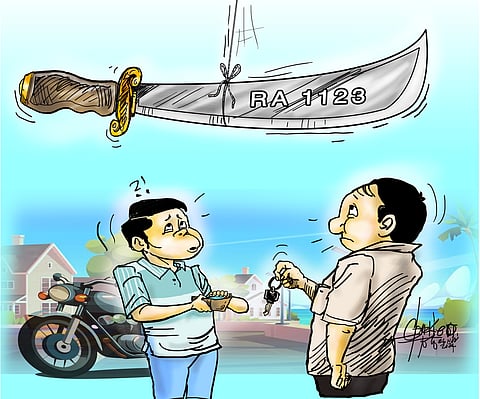
- NEWS
- the EDIT
- COMMENTARY
- BUSINESS
- LIFE
- SHOW
- ACTION
- GLOBAL GOALS
- SNAPS
- DYARYO TIRADA
- MORE

A Land Transportation Office (LTO) administrative order — which penalizes with a combined fine of P40,000 the non-reporting within five days and the non-registration within 20 days of sold or donated second-hand vehicles — remains a Sword of Damocles hanging over the public’s collective head.
As admitted by LTO Executive Director Greg Pua Jr. during the last hearing of the House Committee on Transportation, they merely deferred on 23 October the implementation of LTO AO VDM 2024-046 to “enhance its implementation, extend the compliance period, and improve information dissemination.”
A P20,000 fine if one fails to report to the LTO within five days the sale of a vehicle, and another whopping P20,000 fine if the buyer fails to register under his name the same vehicle within 20 days?
Wait a New York minute! We, the people, are not swimming in money to afford such hefty fines, especially since, when it comes to registering second-hand vehicles, LTO offices — as shown by Partylist Rep. Bonifacio Bosita during many of his shows—cannot be expected to complete the process within 20 days.
Twenty days is just too short, as sellers need to submit documents (Certificate of Registration, Official Receipt, and notarized Deed of Sale), and buyers must deal with multiple agencies, like the Philippine National Police Highway Patrol Group (to ensure the vehicle is not stolen), for clearances to complete the transfer.
As if the processes are not tedious and convoluted enough, now comes the LTO threatening the public with fines for failure to complete a process imbued with factors not entirely within their control.
It feels as though sellers and buyers of second-hand vehicles are being set up for failure, going through the convoluted LTO registration process, only to be forced to pay hefty fines under an AO that, as pointed out by committee chair Rep. Romeo Acop, stands on wobbly legal legs.
AO VDM 2024-046’s dubious legality emanates from its being anchored, according to Pua, on Republic Act 11235, also known as the Motorcycle Crime Prevention Act. The LTO official said that while the law applies only to motorcycles, they sought to apply it as well to motor vehicles like cars and vans to be fair to everyone.
That retort by Pua prompted Acop to state that, insofar as motor vehicles are concerned, AO VDM 2024-046 has no legal support since RA 11235 only applies to motorcycles. This glaring fact should serve as fodder for motor vehicle sellers and buyers to contest any fine levied on them under the AO.
Authored by then Senator Richard Gordon, RA 11235 was aimed at addressing growing concerns over the use of motorcycles in criminal activities, such as drive-by shootings and robberies, by prescribing huge license plates and better tracking of motorcycle ownership.
The law’s intent may be good, but it is an abomination as a piece of class legislation that discriminates against motorcycle users, painting them as potential criminals more than users of four-wheeled vehicles.
Without saying so, the LTO during the House hearing intimated at the discriminatory nature of RA 11235 by seeking to apply the fines anchored on it under AO VDM 2024-046 not only to motorcycle owners but also to owners of motor vehicles.
That move by the LTO is akin to compounding another mistake (including motor vehicle owners within the ambit of the flawed motorcycle law authored by Gordon) with the original sin of class legislation (RA 11235) being allowed to pass.
Acop and Bosita enjoined the LTO to study further the effects on the public of its AO and to fast-track the process involved in the transfer of ownership of second-hand vehicles. The two lawmakers could have wielded the mailed fists they are known to have when dealing with resource persons.
The public interest would be best served if RA 11235 and AO VDM 2024-046 are challenged before the Supreme Court for their apparent unconstitutionality. Even if the rationale behind a move is to prevent the commission of crimes, it should not be made to unduly burden the public as RA 11235 and AO VDM 2024-046 both do.
